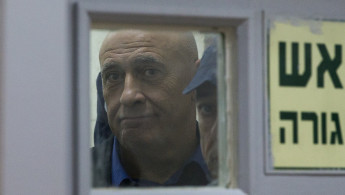Palestinian-Israeli lawmaker joins the prisoners he tried to help
As part of the deal, the Palestinian-Israeli lawmaker confessed that he smuggled the phones to the prisoners saying this was for "humanitarian and moral reasons."
Ghattas told The New Arab that he hoped what he did and the price he will now pay would not go in vain.
"I hope that we as a people, community, civil groups and parties, shall give due attention to the suffering of Palestinian prisoners in the occupation's prisons and put it on the agenda of the Arab and international public opinion," he said.
Ghattas's remarks came minutes after he resigned from the Knesset, ending four years of legislative service since he was elected with the leftwing Palestinian-Israeli 'Balad' bloc.
Ghattas had signed a plea bargain agreement on Thursday in which he confessed to smuggling mobile phones to Palestinian prisoners in Ketziot Prison in the Negev and agreed to serve two years in jail and resign his Knesset seat; the lawmaker was not charged on more serious security related offences.
"In my four years of service, I worked to promote and achieve my people's rights. For me the Knesset is an arena of struggle not a career, and I leave it without regret or bitterness. There are other arenas of struggle where I can serve my people," he told The New Arab.
 |
Ghattas said he signed the plea deal to stop the "racist campaigns of incitement" against Palestinians that accompanied the allegations against him |  |
Ghattas said he signed the plea deal to stop the "racist campaigns of incitement" against Palestinians that accompanied the allegations against him, but admitted that he is worried about going to prison.
"It will not be easy, but despite the pain and the bitterness, this was the best possible option instead of years of trial accompanied by racist and fascist incitement campaigns," he told The New Arab.
After his resignation, it is expected that he will be officially re-indicted by a court on the charges based on what was agreed in the plea bargain. The process could take a few months, after which Ghattas will be jailed, he told The New Arab.
Ghattas's case began in mid-December when the Israeli Prison Service claimed the MK brought mobile phones to prisoners Walid Daqqa and Bassel al-Baraza when he was visiting them.
The allegations unleashed a wave of incitement led by Israeli Prime Minister Binyamin Netanyahu, who called for Ghattas's impeachment, triggering a law that allows this measure if 90 MKs vote in favour following an indictment.
The vote was postponed after a plea bargain was announced last week.
Israeli media reported that 12 mobile phones were found on two separate prisoners in searches after Ghattas visited Ketziot prison in the Negev desert.
One of the prisoners is serving time for the kidnapping and killing of an Israeli soldier in 1984.
The lawmaker, who was briefly arrested at the time, was suspected of passing phones and SIM cards to detainees at the prison on an unspecified date.
As an MP, Ghattas was accused of using parliamentary immunity to escape the search and smuggle the mobile phones into the prison.
Palestinian lawmakers from the 13-seat Joint List, to which Ghattas's Balad party belongs, frequently clash with Israel's leaders.
Palestinian Israelis make up some 17.5 percent of the country's population.
They are the descendants of Palestinians who remained on their land after Israel dispossessed hundreds of thousands of Palestinians in the 1948 Nakba.
They hold Israeli citizenship, but largely see themselves as Palestinians.





 Follow the Middle East's top stories in English at The New Arab on Google News
Follow the Middle East's top stories in English at The New Arab on Google News
![The UAE is widely suspected of arming the RSF militia [Getty]](/sites/default/files/styles/image_330x185/public/2024-11/GettyImages-472529908.jpg?h=69f2b9d0&itok=Yauw3YTG)
![Netanyahu furiously denounced the ICC [Getty]](/sites/default/files/styles/image_330x185/public/2024-11/GettyImages-2169352575.jpg?h=199d8c1f&itok=-vRiruf5)
![Both Hamas and the Palestinian Authority welcomed the ICC arrest warrants [Getty]](/sites/default/files/styles/image_330x185/public/2024-11/GettyImages-2178351173.jpg?h=199d8c1f&itok=TV858iVg)